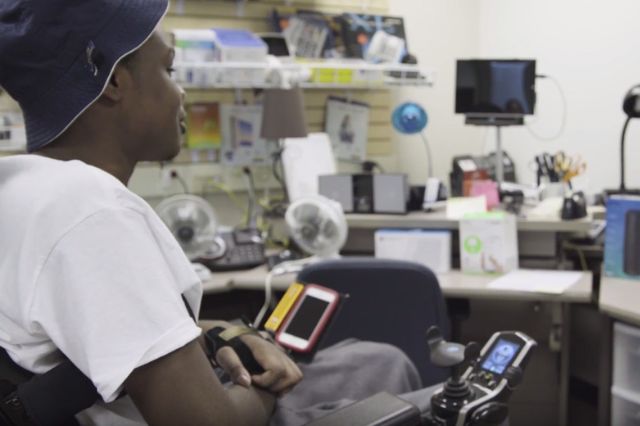Neuropsychology Outpatient Therapy Clinic
Neuropsychological evaluations and therapy by a trained neuropsychologist may be helpful for:
- Identifying possible problems with your brain functioning.
- Forming a diagnosis, defining your thinking skill strengths and weaknesses.
- Guiding treatment for your personal, educational, or vocational needs.
- Making relevant recommendations to your health care provider.
- Documenting possible changes in your functioning over time.
In Shepherd Center’s Neuropsychology Outpatient Clinic, neuropsychologists perform comprehensive neuro-psych evaluations for individuals with concerns about their thinking abilities. Patient questions often relate to specific conditions associated with changes in cognition, such as Alzheimer's disease, brain tumors, Parkinson's disease, multiple sclerosis, epilepsy, stroke, traumatic brain injury, and others.
Neuropsychology and Psychometry
A neuropsychologist is a licensed psychologist with a doctoral degree specializing in brain-behavior relationships. Although a neuropsychologist has a degree in psychology, he or she does not just focus on emotional or psychological problems. Neuropsychologists are educated in brain anatomy, brain functioning, and brain injury or disease.
During your outpatient neuropsychology visit, you may also see a psychometrist. A psychometrist is responsible for administering and scoring psychological and neuropsychological tests under the supervision of a clinical psychologist or clinical neuropsychologist. The psychometrist may also be responsible for collecting demographic information from a patient. The minimum education level for a psychometrist at Shepherd Center outpatient clinic is a master’s degree in psychology or a related field from an accredited college or university.
Neuropsychology Therapy: What to Expect
A neuropsychological therapy evaluation involves testing that is sensitive to problems in brain functioning. Unlike CT or MRI scans, which show the structure of the brain, neuropsychological testing examines how well the brain is working when it performs certain functions (for example, remembering). The tests at our outpatient clinic may assess attention, memory, reason, problem-solving, visual-spatial functions, sensory-perceptual functions, academic skills, language functions, motor functions, and emotional and behavioral functions.
The neuro-psych tests are not invasive and do not involve attaching you to machines or using X-rays. Most of the tests are interactive, with the psychometrist asking questions or asking you to solve problems or remember things. Many of the tests at our outpatient clinic involve working with materials on a table, but tests may use a computerized format. Either a neuropsychologist or a psychometrist will perform the testing. The neuropsychologist will also spend some time talking with you about your medical, personal, and school history to fully understand things that may be impacting your current level of functioning. The total time involved in your neuropsychology therapy evaluation will depend upon the information asked by you and your doctor.
Preparing for Your Neuropsychology Visit
A history form will be mailed to you prior to your appointment with one of our neuropsychologists. Please bring that completed form with you to the appointment. Be sure to bring a copy of your current medication list and any relevant medical records, including neuroimaging disks or prior neuropsychological evaluations. Please be sure to bring glasses or hearing aids, if you wear them.
Additionally, please consider these recommendations:
- Get a good night's rest the night before.
- Take your medications as prescribed (if applicable).
- Be sure to eat prior to the appointment, and consider bringing snacks if your appointment is longer than two hours. If you are scheduled for a six- to eight-hour appointment, you will be given 30 minutes to an hour for a lunch break. You can bring a lunch or visit the cafeteria on the ground floor at Shepherd Center.
- If you have a family member or friend who knows about your condition or current problems, please consider having that person accompany you to the appointment. You may be asked if the neuropsychologist can speak with that person while you complete the testing. Note that family members are not permitted in the examination room during testing.
After Neuropsychology Evaluation
Results will be available about three weeks after your appointment date. In many cases, results will be available before then. Patients may obtain copies of their neuropsychological evaluation through the Health Information Management Department on the sixth floor at Shepherd Center upon proper authorization. Visit our Medical Records page to learn more and download the release form.
The results of your neuropsychological evaluation will be automatically sent to your referring doctor at Shepherd Center for treatment purposes. You do not need to sign a Release of Information (ROI) Form for this purpose. However, if you want your results sent to a family member, doctor outside of Shepherd Center, or another individual, you must complete a Release of Information Form.
Each patient seen in the Neuropsychology Outpatient Clinic will be given the choice to have their data confidentially entered into the Neuropsychology REDCap. Shepherd Center’s Neuropsychology Department collects clinical and neuropsychological assessment data for ongoing anonymous or coded research to examine brain-behavior relationships. If your information is included in our data registry, your name and birthdate will not be used in order to protect your privacy. Information used will include basic demographic information and the date and type of injury. This will not require you to do anything additional now or in the future that would not otherwise be part of your evaluation. This is voluntary. You have the right to request that your information not be included in the registry for ongoing research purposes. Our patients and research participants are the focus of the Neuropsychology Department at Shepherd Center, and the more data collected, the better tools our neuropsychologists have to understand and treat neuropsychological diseases.





